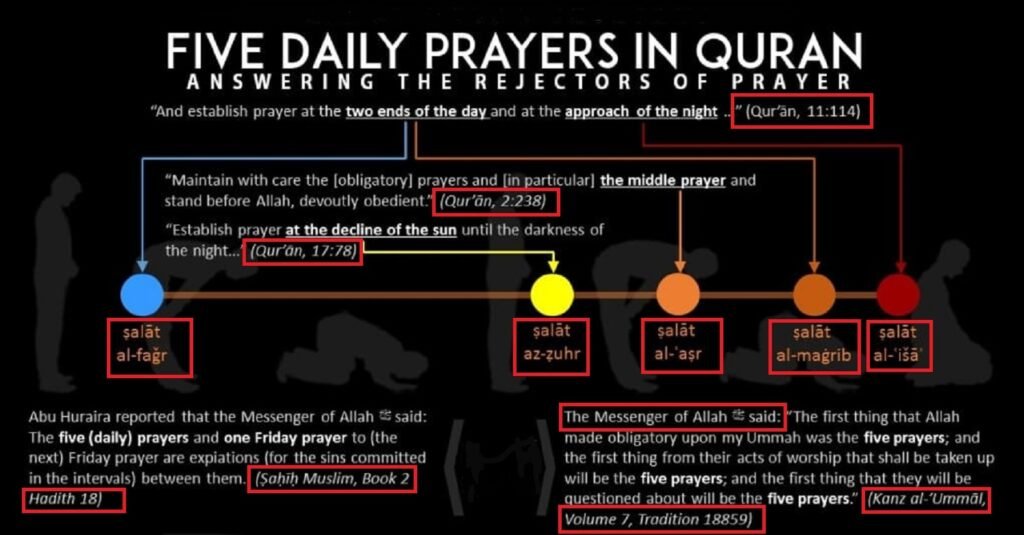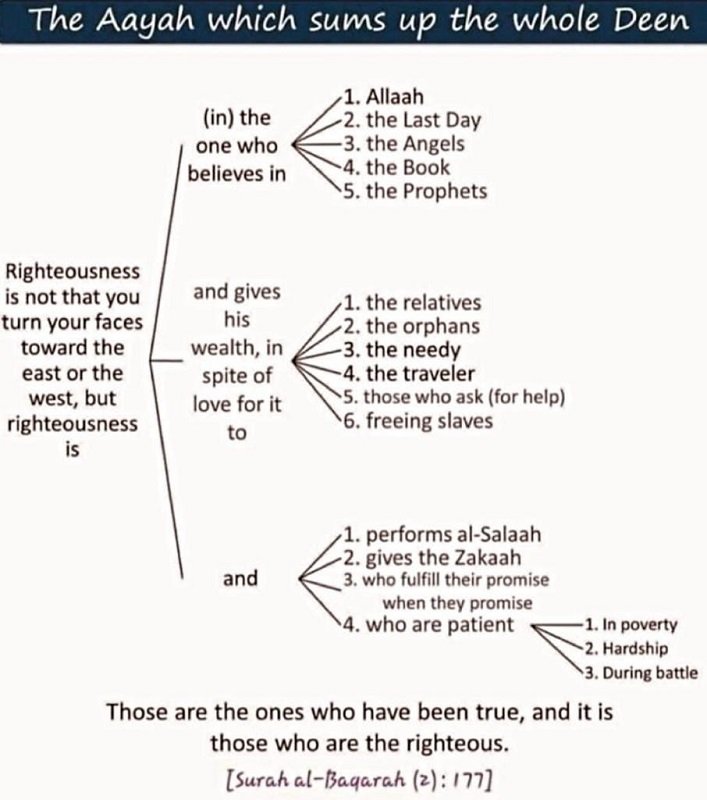𝐀𝐫𝐞 𝐭𝐡𝐞 𝐟𝐢𝐯𝐞 𝐝𝐚𝐢𝐥𝐲 𝐩𝐫𝐚𝐲𝐞𝐫𝐬 𝐦𝐞𝐧𝐭𝐢𝐨𝐧𝐞𝐝 𝐢𝐧 𝐭𝐡𝐞 𝐐𝐮𝐫𝐚𝐧?
Mohamad Mostafa Nassar
Twitter@NassarMohamadMR
𝐐𝐮𝐞𝐬𝐭𝐢𝐨𝐧
𝐓𝐡𝐞 𝐇𝐨𝐥𝐲 𝐐𝐮𝐫’𝐚𝐧, 𝐒𝐮𝐫𝐚𝐡 𝐀𝐥 𝐑𝐮𝐦 (𝟑𝟎:𝟏𝟕) “𝐒𝐨 (𝐆𝐢𝐯𝐞) 𝐆𝐥𝐨𝐫𝐲 𝐭𝐨 𝐀𝐥𝐥𝐚𝐡, 𝐰𝐡𝐞𝐧 𝐲𝐞 𝐫𝐞𝐚𝐜𝐡 𝐞𝐯𝐞𝐧𝐭𝐢𝐝𝐞 𝐚𝐧𝐝 𝐰𝐡𝐞𝐧 𝐲𝐞 𝐑𝐢𝐬𝐞 𝐢𝐧 𝐭𝐡𝐞 𝐦𝐨𝐫𝐧𝐢𝐧𝐠;” 𝟏𝟖 “𝐘𝐞𝐚, 𝐭𝐨 𝐇𝐢𝐦 𝐛𝐞 𝐏𝐫𝐚𝐢𝐬𝐞, 𝐢𝐧 𝐭𝐡𝐞 𝐇𝐞𝐚𝐯𝐞𝐧𝐬 𝐚𝐧𝐝 𝐨𝐧 𝐄𝐚𝐫𝐭𝐡; 𝐀𝐧𝐝 𝐢𝐧 𝐓𝐡𝐞 𝐋𝐚𝐭𝐞 𝐀𝐟𝐭𝐞𝐫𝐧𝐨𝐨𝐧 𝐚𝐧𝐝 𝐰𝐡𝐞𝐧 𝐓𝐡𝐞 𝐃𝐚𝐲 𝐁𝐞𝐠𝐢𝐧𝐬 𝐭𝐨 𝐃𝐞𝐜𝐥𝐢𝐧𝐞.”
𝐍𝐞𝐞𝐝 𝐄𝐯𝐢𝐝𝐞𝐧𝐜𝐞 𝐢𝐧 𝐫𝐞𝐬𝐩𝐨𝐧𝐬𝐞 𝐭𝐨 𝐬𝐨𝐦𝐞𝐨𝐧𝐞
𝐀𝐧𝐬𝐰𝐞𝐫
𝐏𝐫𝐚𝐢𝐬𝐞 𝐛𝐞 𝐭𝐨 𝐀𝐥𝐥𝐚𝐡.
𝐈𝐧 𝐭𝐡𝐞 𝐓𝐚𝐟𝐬𝐢𝐫=𝐂𝐥𝐚𝐫𝐢𝐟𝐢𝐜𝐚𝐭𝐢𝐨𝐧𝐬 𝐨𝐟 𝐭𝐡𝐢𝐬 𝐯𝐞𝐫𝐬𝐞=𝐚𝐲𝐚𝐡, 𝐢𝐭 𝐢𝐬 𝐫𝐞𝐩𝐨𝐫𝐭𝐞𝐝 𝐭𝐡𝐚𝐭 𝐈𝐛𝐧 ‘𝐀𝐛𝐛𝐚𝐬 (𝐦𝐚𝐲 𝐀𝐥𝐥𝐚𝐡 𝐛𝐞 𝐩𝐥𝐞𝐚𝐬𝐞𝐝 𝐰𝐢𝐭𝐡 𝐡𝐢𝐦) 𝐬𝐚𝐢𝐝: “𝐓𝐡𝐞 𝐟𝐢𝐯𝐞 𝐝𝐚𝐢𝐥𝐲 𝐩𝐫𝐚𝐲𝐞𝐫𝐬 𝐚𝐫𝐞 (𝐦𝐞𝐧𝐭𝐢𝐨𝐧𝐞𝐝) 𝐢𝐧 𝐭𝐡𝐞 𝐐𝐮𝐫’𝐚𝐧.” 𝐇𝐞 𝐰𝐚𝐬 𝐚𝐬𝐤𝐞𝐝, “𝐖𝐡𝐞𝐫𝐞?” 𝐇𝐞 𝐬𝐚𝐢𝐝, “𝐀𝐥𝐥𝐚𝐡 𝐬𝐚𝐲𝐬 (𝐢𝐧𝐭𝐞𝐫𝐩𝐫𝐞𝐭𝐚𝐭𝐢𝐨𝐧 𝐨𝐟 𝐭𝐡𝐞 𝐦𝐞𝐚𝐧𝐢𝐧𝐠):
‘𝐒𝐨 𝐠𝐥𝐨𝐫𝐢𝐟𝐲 𝐀𝐥𝐥𝐚𝐡 𝐰𝐡𝐞𝐧 𝐲𝐨𝐮 𝐜𝐨𝐦𝐞 𝐮𝐩 𝐭𝐨 𝐭𝐡𝐞 𝐞𝐯𝐞𝐧𝐢𝐧𝐠’ 𝐢𝐬 𝐦𝐚𝐠𝐡𝐫𝐢𝐛 𝐚𝐧𝐝 ‘𝐈𝐬𝐡𝐚 𝐩𝐫𝐚𝐲𝐞𝐫’; ‘𝐚𝐧𝐝 𝐰𝐡𝐞𝐧 𝐲𝐨𝐮 𝐞𝐧𝐭𝐞𝐫 𝐭𝐡𝐞 𝐦𝐨𝐫𝐧𝐢𝐧𝐠’ 𝐢𝐬 𝐟𝐚𝐣𝐫 𝐩𝐫𝐚𝐲𝐞𝐫; ‘𝐢𝐧 𝐭𝐡𝐞 𝐚𝐟𝐭𝐞𝐫𝐧𝐨𝐨𝐧’ 𝐢𝐬 ‘𝐀𝐬𝐫 𝐩𝐫𝐚𝐲𝐞𝐫; 𝐚𝐧𝐝 ‘𝐭𝐡𝐞 𝐭𝐢𝐦𝐞 𝐰𝐡𝐞𝐧 𝐭𝐡𝐞 𝐝𝐚𝐲 𝐛𝐞𝐠𝐢𝐧𝐬 𝐭𝐨 𝐝𝐞𝐜𝐥𝐢𝐧𝐞’ 𝐢𝐬 𝐙𝐮𝐡𝐫 𝐩𝐫𝐚𝐲𝐞𝐫.”
𝐎𝐭𝐡𝐞𝐫 𝐦𝐮𝐟𝐚𝐬𝐬𝐢𝐫𝐞𝐞𝐧=𝐬𝐩𝐞𝐜𝐢𝐚𝐥𝐢𝐬𝐭𝐬 𝐰𝐡𝐨 𝐜𝐥𝐚𝐫𝐢𝐟𝐲 𝐭𝐡𝐞 𝐆𝐥𝐨𝐫𝐢𝐨𝐮𝐬 𝐐𝐮𝐫’𝐚𝐧, 𝐬𝐮𝐜𝐡 𝐚𝐬 𝐚𝐥-𝐃𝐚𝐡𝐡𝐚𝐚𝐤 𝐚𝐧𝐝 𝐒𝐚’𝐞𝐞𝐝 𝐢𝐛𝐧 𝐉𝐮𝐛𝐚𝐲𝐫 𝐬𝐚𝐢𝐝 𝐭𝐡𝐞 𝐬𝐚𝐦𝐞 𝐭𝐡𝐢𝐧𝐠.
𝐒𝐨𝐦𝐞 𝐨𝐟 𝐭𝐡𝐞 𝐦𝐮𝐟𝐚𝐬𝐬𝐢𝐫𝐞𝐞𝐧 𝐬𝐚𝐢𝐝 𝐭𝐡𝐚𝐭 𝐭𝐡𝐞𝐬𝐞 𝐯𝐞𝐫𝐬𝐞=𝐀𝐲𝐚𝐭 𝐦𝐞𝐧𝐭𝐢𝐨𝐧 𝐨𝐧𝐥𝐲 𝐟𝐨𝐮𝐫 𝐨𝐟 𝐭𝐡𝐞 𝐩𝐫𝐚𝐲𝐞𝐫𝐬; ‘𝐈𝐬𝐡𝐚 𝐩𝐫𝐚𝐲𝐞𝐫’ 𝐢𝐬 𝐧𝐨𝐭 𝐦𝐞𝐧𝐭𝐢𝐨𝐧𝐞𝐝 𝐡𝐞𝐫𝐞. 𝐁𝐮𝐭 𝐢𝐭 𝐢𝐬 𝐦𝐞𝐧𝐭𝐢𝐨𝐧𝐞𝐝 𝐢𝐧 𝐜𝐡𝐚𝐩𝐭𝐞𝐫 𝐇𝐨𝐨𝐝, 𝐰𝐡𝐞𝐫𝐞 𝐀𝐥𝐥𝐚𝐡 𝐬𝐚𝐲𝐬 (𝐢𝐧𝐭𝐞𝐫𝐩𝐫𝐞𝐭𝐚𝐭𝐢𝐨𝐧 𝐨𝐟 𝐭𝐡𝐞 𝐦𝐞𝐚𝐧𝐢𝐧𝐠): “𝐀𝐧𝐝 𝐢𝐧 𝐬𝐨𝐦𝐞 𝐡𝐨𝐮𝐫𝐬 𝐨𝐟 𝐭𝐡𝐞 𝐧𝐢𝐠𝐡𝐭.” [𝐇𝐨𝐨𝐝 𝟏𝟏:𝟏𝟏𝟒]
𝐌𝐨𝐬𝐭 𝐨𝐟 𝐭𝐡𝐞 𝐦𝐮𝐟𝐚𝐬𝐬𝐢𝐫𝐞𝐞𝐧 𝐚𝐫𝐞 𝐨𝐟 𝐭𝐡𝐞 𝐟𝐢𝐫𝐬𝐭 𝐨𝐩𝐢𝐧𝐢𝐨𝐧. 𝐀𝐥-𝐍𝐚𝐡𝐡𝐚𝐚𝐬 (𝐦𝐚𝐲 𝐀𝐥𝐥𝐚𝐡 𝐡𝐚𝐯𝐞 𝐦𝐞𝐫𝐜𝐲 𝐨𝐧 𝐡𝐢𝐦) 𝐬𝐚𝐢𝐝: 𝐓𝐡𝐞 𝐬𝐜𝐡𝐨𝐥𝐚𝐫𝐬 𝐨𝐟 𝐓𝐚𝐟𝐬𝐢𝐫=𝐂𝐥𝐚𝐫𝐢𝐟𝐢𝐜𝐚𝐭𝐢𝐨𝐧𝐬 𝐨𝐟 𝐐𝐮𝐫𝐚𝐧: 𝐬𝐚𝐲 𝐭𝐡𝐚𝐭 𝐭𝐡𝐞 𝐯𝐞𝐫𝐬𝐞=𝐚𝐲𝐚𝐡 (𝐢𝐧𝐭𝐞𝐫𝐩𝐫𝐞𝐭𝐚𝐭𝐢𝐨𝐧 𝐨𝐟 𝐭𝐡𝐞 𝐦𝐞𝐚𝐧𝐢𝐧𝐠):
‘𝐒𝐨, 𝐠𝐥𝐨𝐫𝐢𝐟𝐲 𝐀𝐥𝐥𝐚𝐡 𝐰𝐡𝐞𝐧 𝐲𝐨𝐮 𝐜𝐨𝐦𝐞 𝐮𝐩 𝐭𝐨 𝐭𝐡𝐞 𝐞𝐯𝐞𝐧𝐢𝐧𝐠 𝐚𝐧𝐝 𝐰𝐡𝐞𝐧 𝐲𝐨𝐮 𝐞𝐧𝐭𝐞𝐫 𝐭𝐡𝐞 𝐦𝐨𝐫𝐧𝐢𝐧𝐠.’ [𝐚𝐥-𝐑𝐨𝐨𝐦 𝟑𝟎:𝟏𝟕] 𝐫𝐞𝐟𝐞𝐫𝐬 𝐭𝐨 𝐭𝐡𝐞 𝐩𝐫𝐚𝐲𝐞𝐫𝐬.”
𝐈𝐦𝐚𝐦 𝐚𝐥-𝐉𝐚𝐬𝐬𝐚𝐚𝐬 (𝐦𝐚𝐲 𝐀𝐥𝐥𝐚𝐡 𝐡𝐚𝐯𝐞 𝐦𝐞𝐫𝐜𝐲 𝐨𝐧 𝐡𝐢𝐦) 𝐬𝐚𝐢𝐝: “𝐀𝐥𝐥𝐚𝐡 𝐬𝐚𝐲𝐬 (𝐢𝐧𝐭𝐞𝐫𝐩𝐫𝐞𝐭𝐚𝐭𝐢𝐨𝐧 𝐨𝐟 𝐭𝐡𝐞 𝐦𝐞𝐚𝐧𝐢𝐧𝐠):
‘𝐓𝐡𝐞 𝐩𝐫𝐚𝐲𝐞𝐫 𝐢𝐬 𝐞𝐧𝐣𝐨𝐢𝐧𝐞𝐝 𝐨𝐧 𝐭𝐡𝐞 𝐛𝐞𝐥𝐢𝐞𝐯𝐞𝐫𝐬 𝐚𝐭 𝐟𝐢𝐱𝐞𝐝 𝐭𝐢𝐦𝐞𝐬 [𝐦𝐚𝐰𝐪𝐨𝐨𝐭𝐚𝐧].’ [𝐚𝐥-𝐍𝐢𝐬𝐚’ 𝟒:𝟏𝟎𝟑].
𝐈𝐭 𝐰𝐚𝐬 𝐫𝐞𝐩𝐨𝐫𝐭𝐞𝐝 𝐭𝐡𝐚𝐭 ‘𝐀𝐛𝐝-𝐀𝐥𝐥𝐚𝐡 𝐢𝐛𝐧 𝐌𝐚𝐬’𝐨𝐨𝐝 𝐬𝐚𝐢𝐝: ‘[𝐌𝐚𝐰𝐪𝐨𝐨𝐭𝐚𝐧 𝐦𝐞𝐚𝐧𝐬 𝐭𝐡𝐚𝐭] 𝐒𝐚𝐥𝐚𝐚𝐡 𝐡𝐚𝐬 𝐚𝐧 𝐚𝐩𝐩𝐨𝐢𝐧𝐭𝐞𝐝 𝐭𝐢𝐦𝐞 𝐣𝐮𝐬𝐭 𝐚𝐬 𝐇𝐚𝐣𝐣 𝐝𝐨𝐞𝐬.’ 𝐈𝐭 𝐰𝐚𝐬 𝐫𝐞𝐩𝐨𝐫𝐭𝐞𝐝 𝐭𝐡𝐚𝐭 𝐈𝐛𝐧 ‘𝐀𝐛𝐛𝐚𝐚𝐬, 𝐌𝐮𝐣𝐚𝐚𝐡𝐢𝐝 𝐚𝐧𝐝 ‘𝐀𝐭𝐢𝐲𝐲𝐚𝐡 𝐬𝐚𝐢𝐝 [𝐭𝐡𝐚𝐭 𝐦𝐚𝐰𝐪𝐨𝐨𝐭𝐚𝐧 𝐦𝐞𝐚𝐧𝐬]
‘𝐈𝐭 𝐢𝐬 𝐨𝐛𝐥𝐢𝐠𝐚𝐭𝐨𝐫𝐲’… 𝐓𝐡𝐞 𝐰𝐨𝐫𝐝 ‘𝐦𝐚𝐰𝐪𝐨𝐨𝐭𝐚𝐧’ 𝐦𝐞𝐚𝐧𝐬 𝐭𝐡𝐚𝐭 𝐢𝐭 𝐢𝐬 𝐨𝐛𝐥𝐢𝐠𝐚𝐭𝐨𝐫𝐲 𝐚𝐭 𝐜𝐞𝐫𝐭𝐚𝐢𝐧 𝐭𝐢𝐦𝐞𝐬. 𝐓𝐡𝐞 𝐭𝐢𝐦𝐞𝐬 𝐚𝐫𝐞 𝐫𝐞𝐟𝐞𝐫𝐫𝐞𝐝 𝐭𝐨 𝐢𝐧 𝐠𝐞𝐧𝐞𝐫𝐚𝐥 𝐭𝐞𝐫𝐦𝐬 𝐢𝐧 𝐭𝐡𝐢𝐬 𝐚𝐲𝐚𝐡=𝐯𝐞𝐫𝐬𝐞 𝐚𝐧𝐝 𝐚𝐫𝐞 𝐞𝐱𝐩𝐥𝐚𝐢𝐧𝐞𝐝 𝐞𝐥𝐬𝐞𝐰𝐡𝐞𝐫𝐞 𝐢𝐧 𝐭𝐡𝐞 𝐁𝐨𝐨𝐤, 𝐰𝐢𝐭𝐡𝐨𝐮𝐭 𝐝𝐞𝐟𝐢𝐧𝐢𝐧𝐠 𝐩𝐫𝐞𝐜𝐢𝐬𝐞𝐥𝐲 𝐰𝐡𝐞𝐧 𝐭𝐡𝐨𝐬𝐞 𝐭𝐢𝐦𝐞𝐬 𝐬𝐭𝐚𝐫𝐭 𝐚𝐧𝐝 𝐞𝐧𝐝 – 𝐭𝐡𝐚𝐭 𝐰𝐚𝐬 𝐞𝐱𝐩𝐥𝐚𝐢𝐧𝐞𝐝 𝐢𝐧 𝐝𝐞𝐭𝐚𝐢𝐥 𝐛𝐲 𝐭𝐡𝐞 𝐌𝐞𝐬𝐬𝐞𝐧𝐠𝐞𝐫 𝐨𝐟 𝐀𝐥𝐥𝐚𝐡 (𝐩𝐞𝐚𝐜𝐞 𝐚𝐧𝐝 𝐛𝐥𝐞𝐬𝐬𝐢𝐧𝐠𝐬 𝐨𝐟 𝐀𝐥𝐥𝐚𝐡 𝐛𝐞 𝐮𝐩𝐨𝐧 𝐡𝐢𝐦).
𝐖𝐡𝐚𝐭 𝐀𝐥𝐥𝐚𝐡 𝐦𝐞𝐧𝐭𝐢𝐨𝐧𝐞𝐝 𝐚𝐛𝐨𝐮𝐭 𝐭𝐡𝐞 𝐭𝐢𝐦𝐞𝐬 𝐨𝐟 𝐭𝐡𝐞 𝐩𝐫𝐚𝐲𝐞𝐫𝐬 𝐢𝐧 𝐇𝐢𝐬 𝐁𝐨𝐨𝐤 𝐢𝐬 (𝐢𝐧𝐭𝐞𝐫𝐩𝐫𝐞𝐭𝐚𝐭𝐢𝐨𝐧 𝐨𝐟 𝐭𝐡𝐞 𝐦𝐞𝐚𝐧𝐢𝐧𝐠): “𝐏𝐞𝐫𝐟𝐨𝐫𝐦 𝐚𝐥-𝐒𝐚𝐥𝐚𝐚𝐡 𝐟𝐫𝐨𝐦 𝐦𝐢𝐝-𝐝𝐚𝐲 𝐭𝐢𝐥𝐥 𝐭𝐡𝐞 𝐝𝐚𝐫𝐤𝐧𝐞𝐬𝐬 𝐨𝐟 𝐭𝐡𝐞 𝐧𝐢𝐠𝐡𝐭 𝐚𝐧𝐝 𝐫𝐞𝐜𝐢𝐭𝐞 𝐭𝐡𝐞 𝐐𝐮𝐫’𝐚𝐧 𝐢𝐧 𝐭𝐡𝐞 𝐞𝐚𝐫𝐥𝐲 𝐝𝐚𝐰𝐧…” 𝐐𝐮𝐫𝐚𝐧 [𝐚𝐥-𝐈𝐬𝐫𝐚’ 𝟏𝟕:𝟕𝟖].
𝐌𝐮𝐣𝐚𝐚𝐡𝐢𝐝 𝐫𝐞𝐩𝐨𝐫𝐭𝐞𝐝 𝐟𝐫𝐨𝐦 𝐈𝐛𝐧 ‘𝐀𝐛𝐛𝐚𝐬: “’𝐌𝐢𝐝-𝐝𝐚𝐲’ 𝐦𝐞𝐚𝐧𝐬 𝐰𝐡𝐞𝐧 𝐭𝐡𝐞 𝐬𝐮𝐧 𝐡𝐚𝐬 𝐩𝐚𝐬𝐬𝐞𝐝 𝐢𝐭𝐬 𝐳𝐞𝐧𝐢𝐭𝐡 𝐟𝐨𝐫 𝐬𝐚𝐥𝐚𝐚𝐭 𝐚𝐥-𝐙𝐮𝐡𝐫 𝐩𝐫𝐚𝐲𝐞𝐫, 𝐚𝐧𝐝 ‘𝐭𝐡𝐞 𝐝𝐚𝐫𝐤𝐧𝐞𝐬𝐬 𝐨𝐟 𝐭𝐡𝐞 𝐧𝐢𝐠𝐡𝐭’ 𝐦𝐞𝐚𝐧𝐬 𝐭𝐡𝐞 𝐛𝐞𝐠𝐢𝐧𝐧𝐢𝐧𝐠 𝐨𝐟 𝐭𝐡𝐞 𝐧𝐢𝐠𝐡𝐭, 𝐟𝐨𝐫 𝐬𝐚𝐥𝐚𝐚𝐭 𝐚𝐥-𝐦𝐚𝐠𝐡𝐫𝐢𝐛.”
𝐈𝐭 𝐰𝐚𝐬 𝐚𝐥𝐬𝐨 𝐫𝐞𝐩𝐨𝐫𝐭𝐞𝐝 𝐟𝐫𝐨𝐦 𝐈𝐛𝐧 ‘𝐔𝐦𝐚𝐫 𝐭𝐡𝐚𝐭 𝐦𝐢𝐝-𝐝𝐚𝐲 𝐦𝐞𝐚𝐧𝐭 𝐭𝐡𝐞 𝐳𝐞𝐧𝐢𝐭𝐡… 𝐀𝐥𝐥𝐚𝐡 𝐬𝐚𝐲𝐬 (𝐈𝐧𝐭𝐞𝐫𝐩𝐫𝐞𝐭𝐚𝐭𝐢𝐨𝐧 𝐨𝐟 𝐭𝐡𝐞 𝐦𝐞𝐚𝐧𝐢𝐧𝐠): “𝐀𝐧𝐝 𝐩𝐞𝐫𝐟𝐨𝐫𝐦 𝐚𝐥-𝐬𝐚𝐥𝐚𝐚𝐡 𝐚𝐭 𝐭𝐡𝐞 𝐭𝐰𝐨 𝐞𝐧𝐝𝐬 𝐨𝐟 𝐭𝐡𝐞 𝐝𝐚𝐲 𝐚𝐧𝐝 𝐢𝐧 𝐬𝐨𝐦𝐞 𝐩𝐚𝐫𝐭𝐬 𝐨𝐟 𝐭𝐡𝐞 𝐧𝐢𝐠𝐡𝐭” 𝐐𝐮𝐫𝐚𝐧 [𝐇𝐨𝐨𝐝 𝟏𝟏:𝟏𝟏𝟒].
‘𝐀𝐦𝐫 𝐫𝐞𝐩𝐨𝐫𝐭𝐞𝐝 𝐟𝐫𝐨𝐦 𝐚𝐥-𝐇𝐚𝐬𝐚𝐧 𝐭𝐡𝐚𝐭 ‘𝐭𝐡𝐞 𝐭𝐰𝐨 𝐞𝐧𝐝𝐬 𝐨𝐟 𝐭𝐡𝐞 𝐝𝐚𝐲’ 𝐦𝐞𝐚𝐧𝐬 𝐟𝐚𝐣𝐫 𝐩𝐫𝐚𝐲𝐞𝐫 𝐚𝐭 𝐭𝐡𝐞 𝐟𝐢𝐫𝐬𝐭 𝐞𝐧𝐝 𝐚𝐧𝐝 𝐳𝐮𝐡𝐫 𝐩𝐫𝐚𝐲𝐞𝐫 𝐚𝐧𝐝 ‘𝐀𝐬𝐫 𝐩𝐫𝐚𝐲𝐞𝐫 𝐚𝐭 𝐭𝐡𝐞 𝐨𝐭𝐡𝐞𝐫; ‘𝐬𝐨𝐦𝐞 𝐩𝐚𝐫𝐭𝐬 𝐨𝐟 𝐭𝐡𝐞 𝐧𝐢𝐠𝐡𝐭’ 𝐦𝐞𝐚𝐧𝐬 𝐦𝐚𝐠𝐡𝐫𝐢𝐛 𝐚𝐧𝐝 ‘𝐈𝐬𝐡𝐚 𝐩𝐫𝐚𝐲𝐞𝐫’.
𝐒𝐨 𝐚𝐜𝐜𝐨𝐫𝐝𝐢𝐧𝐠 𝐭𝐨 𝐭𝐡𝐢𝐬 𝐨𝐩𝐢𝐧𝐢𝐨𝐧 𝐭𝐡𝐞 𝐚𝐲𝐚𝐡=𝐯𝐞𝐫𝐬𝐞 𝐫𝐞𝐟𝐞𝐫𝐬 𝐭𝐨 𝐚𝐥𝐥 𝐟𝐢𝐯𝐞 𝐩𝐫𝐚𝐲𝐞𝐫𝐬…. 𝐋𝐚𝐲𝐭𝐡 𝐫𝐞𝐩𝐨𝐫𝐭𝐞𝐝 𝐟𝐫𝐨𝐦 𝐚𝐥-𝐇𝐚𝐤𝐚𝐦 𝐟𝐫𝐨𝐦 𝐀𝐛𝐮 ‘𝐀𝐲𝐲𝐚𝐚𝐝 𝐭𝐡𝐚𝐭 𝐈𝐛𝐧 ‘𝐀𝐛𝐛𝐚𝐬 𝐬𝐚𝐢𝐝: “𝐓𝐡𝐢𝐬 𝐚𝐲𝐚𝐡=𝐯𝐞𝐫𝐬𝐞 𝐦𝐞𝐧𝐭𝐢𝐨𝐧𝐬 𝐚𝐥𝐥 𝐟𝐢𝐯𝐞 𝐩𝐫𝐚𝐲𝐞𝐫𝐬 𝐭𝐨𝐠𝐞𝐭𝐡𝐞𝐫.
‘𝐒𝐨, 𝐠𝐥𝐨𝐫𝐢𝐟𝐲 𝐀𝐥𝐥𝐚𝐡 𝐰𝐡𝐞𝐧 𝐲𝐨𝐮 𝐜𝐨𝐦𝐞 𝐮𝐩 𝐭𝐨 𝐭𝐡𝐞 𝐞𝐯𝐞𝐧𝐢𝐧𝐠’ 𝐫𝐞𝐟𝐞𝐫𝐬 𝐭𝐨 𝐦𝐚𝐠𝐡𝐫𝐢𝐛 𝐚𝐧𝐝 ‘𝐈𝐬𝐡𝐚 𝐩𝐫𝐚𝐲𝐞𝐫’, ‘𝐚𝐧𝐝 𝐰𝐡𝐞𝐧 𝐲𝐨𝐮 𝐞𝐧𝐭𝐞𝐫 𝐭𝐡𝐞 𝐦𝐨𝐫𝐧𝐢𝐧𝐠’ 𝐫𝐞𝐟𝐞𝐫𝐬 𝐭𝐨 𝐟𝐚𝐣𝐫 𝐩𝐫𝐚𝐲𝐞𝐫, ‘𝐢𝐧 𝐭𝐡𝐞 𝐚𝐟𝐭𝐞𝐫𝐧𝐨𝐨𝐧’ 𝐢𝐬 ‘𝐀𝐬𝐫; 𝐚𝐧𝐝 ‘𝐭𝐡𝐞 𝐭𝐢𝐦𝐞 𝐖𝐡𝐞𝐧 𝐭𝐡𝐞 𝐝𝐚𝐲 𝐛𝐞𝐠𝐢𝐧𝐬 𝐭𝐨 𝐝𝐞𝐜𝐥𝐢𝐧𝐞’ 𝐢𝐬 𝐳𝐮𝐡𝐫 𝐩𝐫𝐚𝐲𝐞𝐫.” 𝐒𝐨𝐦𝐞𝐭𝐡𝐢𝐧𝐠 𝐬𝐢𝐦𝐢𝐥𝐚𝐫 𝐰𝐚𝐬 𝐚𝐥𝐬𝐨 𝐫𝐞𝐩𝐨𝐫𝐭𝐞𝐝 𝐟𝐫𝐨𝐦 𝐚𝐥-𝐇𝐚𝐬𝐚𝐧.
𝐀𝐛𝐮 𝐑𝐚𝐳𝐞𝐞𝐧 𝐫𝐞𝐩𝐨𝐫𝐭𝐞𝐝 𝐟𝐫𝐨𝐦 𝐈𝐛𝐧 ‘𝐀𝐛𝐛𝐚𝐬: “𝐀𝐧𝐝 𝐠𝐥𝐨𝐫𝐢𝐟𝐲 𝐭𝐡𝐞 𝐩𝐫𝐚𝐢𝐬𝐞𝐬 𝐨𝐟 𝐲𝐨𝐮𝐫 𝐋𝐨𝐫𝐝 𝐛𝐞𝐟𝐨𝐫𝐞 𝐭𝐡𝐞 𝐫𝐢𝐬𝐢𝐧𝐠 𝐨𝐟 𝐭𝐡𝐞 𝐬𝐮𝐧 𝐚𝐧𝐝 𝐛𝐞𝐟𝐨𝐫𝐞 (𝐢𝐭𝐬) 𝐬𝐞𝐭𝐭𝐢𝐧𝐠’ 𝐐𝐮𝐫𝐚𝐧 𝐜𝐡𝐚𝐩𝐭𝐞𝐫 𝐐𝐚𝐚𝐟 𝟓𝟎:𝟑𝟗 – 𝐢𝐧𝐭𝐞𝐫𝐩𝐫𝐞𝐭𝐚𝐭𝐢𝐨𝐧 𝐨𝐟 𝐭𝐡𝐞 𝐦𝐞𝐚𝐧𝐢𝐧𝐠]

𝐑𝐞𝐟𝐞𝐫𝐬 𝐭𝐨 𝐭𝐡𝐞 𝐩𝐫𝐞𝐬𝐜𝐫𝐢𝐛𝐞𝐝 𝐩𝐫𝐚𝐲𝐞𝐫𝐬:
‘𝐀𝐧𝐝 𝐠𝐥𝐨𝐫𝐢𝐟𝐲 𝐭𝐡𝐞 𝐩𝐫𝐚𝐢𝐬𝐞𝐬 𝐨𝐟 𝐲𝐨𝐮𝐫 𝐋𝐨𝐫𝐝 𝐛𝐞𝐟𝐨𝐫𝐞 𝐭𝐡𝐞 𝐫𝐢𝐬𝐢𝐧𝐠 𝐨𝐟 𝐭𝐡𝐞 𝐬𝐮𝐧, 𝐚𝐧𝐝 𝐛𝐞𝐟𝐨𝐫𝐞 𝐢𝐭𝐬 𝐬𝐞𝐭𝐭𝐢𝐧𝐠, 𝐚𝐧𝐝 𝐝𝐮𝐫𝐢𝐧𝐠 𝐬𝐨𝐦𝐞 𝐨𝐟 𝐭𝐡𝐞 𝐡𝐨𝐮𝐫𝐬 𝐨𝐟 𝐭𝐡𝐞 𝐧𝐢𝐠𝐡𝐭. 𝐀𝐧𝐝 𝐚𝐭 𝐭𝐡𝐞 𝐬𝐢𝐝𝐞𝐬 𝐨𝐟 𝐭𝐡𝐞 𝐝𝐚𝐲, 𝐭𝐡𝐚𝐭 𝐲𝐨𝐮 𝐦𝐚𝐲 𝐛𝐞𝐜𝐨𝐦𝐞 𝐩𝐥𝐞𝐚𝐬𝐞𝐝 𝐰𝐢𝐭𝐡 𝐭𝐡𝐞 𝐫𝐞𝐰𝐚𝐫𝐝 𝐰𝐡𝐢𝐜𝐡 𝐀𝐥𝐥𝐚𝐡 𝐬𝐡𝐚𝐥𝐥 𝐠𝐢𝐯𝐞 𝐲𝐨𝐮.’
[𝐓𝐚-𝐇𝐚 𝟐𝟎:𝟏𝟑𝟎 – 𝐢𝐧𝐭𝐞𝐫𝐩𝐫𝐞𝐭𝐚𝐭𝐢𝐨𝐧 𝐨𝐟 𝐭𝐡𝐞 𝐦𝐞𝐚𝐧𝐢𝐧𝐠]
𝐓𝐡𝐢𝐬 𝐚𝐲𝐚𝐡=𝐯𝐞𝐫𝐬𝐞 𝐚𝐥𝐬𝐨 𝐢𝐧𝐜𝐥𝐮𝐝𝐞𝐬 𝐭𝐡𝐞 𝐭𝐢𝐦𝐞𝐬 𝐨𝐟 𝐭𝐡𝐞 𝐩𝐫𝐚𝐲𝐞𝐫𝐬. 𝐀𝐥𝐥 𝐨𝐟 𝐭𝐡𝐞𝐬𝐞 𝐀𝐲𝐚𝐭=𝐯𝐞𝐫𝐬𝐞𝐬 𝐦𝐞𝐧𝐭𝐢𝐨𝐧 𝐭𝐡𝐞 𝐭𝐢𝐦𝐞𝐬 𝐨𝐟 𝐭𝐡𝐞 𝐩𝐫𝐚𝐲𝐞𝐫𝐬.”
𝐀𝐡𝐤𝐚𝐚𝐦 𝐚𝐥-𝐐𝐮𝐫’𝐚𝐧 𝐛𝐲 𝐚𝐥-𝐉𝐚𝐬𝐬𝐚𝐚𝐬, 𝐁𝐚𝐚𝐛 𝐌𝐚𝐰𝐚𝐚𝐪𝐞𝐞𝐭 𝐚𝐥-𝐒𝐚𝐥𝐚𝐚𝐡.
𝐖𝐡𝐚𝐭 𝐲𝐨𝐮 𝐬𝐡𝐨𝐮𝐥𝐝 𝐚𝐥𝐬𝐨 𝐤𝐧𝐨𝐰 𝐢𝐬 𝐭𝐡𝐚𝐭 𝐭𝐡𝐞 𝐐𝐮𝐫’𝐚̂𝐧 𝐝𝐨𝐞𝐬 𝐧𝐨𝐭 𝐜𝐨𝐧𝐭𝐚𝐢𝐧 𝐝𝐞𝐭𝐚𝐢𝐥𝐬 𝐨𝐟 𝐚𝐥𝐥 𝐭𝐡𝐞 𝐫𝐮𝐥𝐞𝐬. 𝐓𝐡𝐞 𝐐𝐮𝐫’𝐚̂𝐧 𝐦𝐞𝐧𝐭𝐢𝐨𝐧𝐬 𝐦𝐚𝐧𝐲 𝐫𝐮𝐥𝐞𝐬, 𝐛𝐮𝐭 𝐢𝐭 𝐚𝐥𝐬𝐨 𝐭𝐞𝐥𝐥𝐬 𝐮𝐬 𝐭𝐡𝐚𝐭 𝐭𝐡𝐞 𝐒𝐮𝐧𝐧𝐚𝐡 𝐢𝐬 𝐚 𝐬𝐨𝐮𝐫𝐜𝐞 𝐨𝐟 𝐞𝐯𝐢𝐝𝐞𝐧𝐜𝐞 𝐢𝐧 𝐰𝐡𝐢𝐜𝐡 𝐦𝐚𝐧𝐲 𝐫𝐮𝐥𝐞𝐬 𝐚𝐫𝐞 𝐦𝐞𝐧𝐭𝐢𝐨𝐧𝐞𝐝 𝐢𝐧 𝐝𝐞𝐭𝐚𝐢𝐥 𝐭𝐡𝐚𝐭 𝐚𝐫𝐞 𝐧𝐨𝐭 𝐦𝐞𝐧𝐭𝐢𝐨𝐧𝐞𝐝 𝐢𝐧 𝐭𝐡𝐞 𝐐𝐮𝐫’𝐚̂𝐧.
𝐀𝐥𝐥𝐚𝐡 𝐬𝐚𝐲𝐬 (𝐢𝐧𝐭𝐞𝐫𝐩𝐫𝐞𝐭𝐚𝐭𝐢𝐨𝐧 𝐨𝐟 𝐭𝐡𝐞 𝐦𝐞𝐚𝐧𝐢𝐧𝐠𝐬):
“𝐀𝐧𝐝 𝐖𝐞 𝐡𝐚𝐯𝐞 𝐚𝐥𝐬𝐨 𝐬𝐞𝐧𝐭 𝐝𝐨𝐰𝐧 𝐭𝐨 𝐲𝐨𝐮 (𝐎 𝐌𝐮𝐡𝐚𝐦𝐦𝐚𝐝) 𝐭𝐡𝐞 𝐫𝐞𝐦𝐢𝐧𝐝𝐞𝐫 𝐚𝐧𝐝 𝐭𝐡𝐞 𝐚𝐝𝐯𝐢𝐜𝐞 (𝐭𝐡𝐞 𝐐𝐮𝐫’𝐚̂𝐧), 𝐭𝐡𝐚𝐭 𝐲𝐨𝐮 𝐦𝐚𝐲 𝐞𝐱𝐩𝐥𝐚𝐢𝐧 𝐜𝐥𝐞𝐚𝐫𝐥𝐲 𝐭𝐨 𝐦𝐞𝐧 𝐰𝐡𝐚𝐭 𝐢𝐬 𝐬𝐞𝐧𝐭 𝐝𝐨𝐰𝐧 𝐭𝐨 𝐭𝐡𝐞𝐦 𝐚𝐧𝐝 𝐭𝐡𝐚𝐭 𝐭𝐡𝐞𝐲 𝐦𝐚𝐲 𝐠𝐢𝐯𝐞 𝐭𝐡𝐨𝐮𝐠𝐡𝐭.” 𝐐𝐮𝐫𝐚𝐧 [𝐚𝐥-𝐍𝐚𝐡𝐥 𝟏𝟔:𝟒𝟒]
“𝐀𝐧𝐝 𝐰𝐡𝐚𝐭𝐬𝐨𝐞𝐯𝐞𝐫 𝐭𝐡𝐞 𝐌𝐞𝐬𝐬𝐞𝐧𝐠𝐞𝐫 𝐠𝐢𝐯𝐞𝐬 𝐲𝐨𝐮, 𝐭𝐚𝐤𝐞 𝐢𝐭…” 𝐐𝐮𝐫𝐚𝐧 [𝐚𝐥-𝐇𝐚𝐬𝐡𝐫 𝟓𝟗:𝟕]
𝐓𝐡𝐞 𝐏𝐫𝐨𝐩𝐡𝐞𝐭 (𝐩𝐞𝐚𝐜𝐞 𝐚𝐧𝐝 𝐛𝐥𝐞𝐬𝐬𝐢𝐧𝐠𝐬 𝐨𝐟 𝐀𝐥𝐥𝐚𝐡 𝐛𝐞 𝐮𝐩𝐨𝐧 𝐡𝐢𝐦) 𝐬𝐚𝐢𝐝: “𝐈 𝐡𝐚𝐯𝐞 𝐛𝐞𝐞𝐧 𝐠𝐢𝐯𝐞𝐧 𝐭𝐡𝐞 𝐐𝐮𝐫’𝐚𝐧 𝐚𝐧𝐝 𝐬𝐨𝐦𝐞𝐭𝐡𝐢𝐧𝐠 𝐥𝐢𝐤𝐞 𝐢𝐭 𝐰𝐢𝐭𝐡 𝐢𝐭”
(𝐑𝐞𝐩𝐨𝐫𝐭𝐞𝐝 𝐛𝐲 𝐈𝐦𝐚𝐦 𝐀𝐡𝐦𝐚𝐝, 𝟏𝟔𝟓𝟒𝟔; 𝐭𝐡𝐢𝐬 𝐢𝐬 𝐚 𝐬𝐚𝐡𝐢𝐡 𝐡𝐚𝐝𝐞𝐞𝐭𝐡).
𝐖𝐡𝐞𝐭𝐡𝐞𝐫 𝐭𝐡𝐞 𝐫𝐮𝐥𝐞𝐬 𝐰𝐞𝐫𝐞 𝐧𝐚𝐫𝐫𝐚𝐭𝐞𝐝 𝐢𝐧 𝐭𝐡𝐞 𝐐𝐮𝐫𝐚𝐧 𝐨𝐫 𝐢𝐧 𝐭𝐡𝐞 𝐀𝐮𝐭𝐡𝐞𝐧𝐭𝐢𝐜 𝐒𝐮𝐧𝐧𝐚𝐡, 𝐚𝐥𝐥 𝐨𝐟 𝐢𝐭 𝐢𝐬 𝐭𝐫𝐮𝐞 𝐚𝐧𝐝 𝐫𝐢𝐠𝐡𝐭, 𝐚𝐧𝐝 𝐚𝐥𝐥 𝐨𝐟 𝐢𝐭 𝐡𝐚𝐬 𝐨𝐧𝐞 𝐬𝐨𝐮𝐫𝐜𝐞, 𝐰𝐡𝐢𝐜𝐡 𝐢𝐬 𝐭𝐡𝐞 𝐖𝐚𝐡𝐲=𝐑𝐞𝐯𝐞𝐥𝐚𝐭𝐢𝐨𝐧 𝐟𝐫𝐨𝐦 𝐭𝐡𝐞 𝐋𝐨𝐫𝐝 𝐨𝐟 𝐭𝐡𝐞 𝐖𝐨𝐫𝐥𝐝𝐬.
𝐓𝐡𝐞 𝐐𝐮𝐫𝐚𝐧𝐢𝐜 𝐕𝐞𝐫𝐬𝐞 𝐰𝐡𝐢𝐜𝐡 𝐬𝐮𝐦𝐬 𝐮𝐩 𝐭𝐡𝐞 𝐰𝐡𝐨𝐥𝐞 𝐫𝐞𝐥𝐢𝐠𝐢𝐨𝐧 𝐨𝐟 𝐈𝐬𝐥𝐚𝐦 𝐐𝐮𝐫𝐚𝐧 (𝟐:𝟏𝟕𝟕)

𝐀𝐥𝐥𝐚𝐡 𝐊𝐧𝐨𝐰𝐬 𝐁𝐞𝐬𝐭.
𝐑𝐞𝐟𝐞𝐫𝐞𝐧𝐜𝐞𝐬:
Why do Muslims mention Prophet Muhammad in Tashahud?
The Miraculous Night Journey and the Divine Reduction of the Number of Daily Prayers in Islam
The Five Pillars of Islam in The Glorious Qur’an
The six pillars of Imaan (Faith)
The Shahadah: The First Pillar of Islam in The Glorious Qur’an
Five Pillars of Islam in the Bible – Islam in the Bible
Why Is Prophet Muhammad Mentioned in the Shahadah?
Does the Quran Specifically Refer to the Five Daily Prayers?